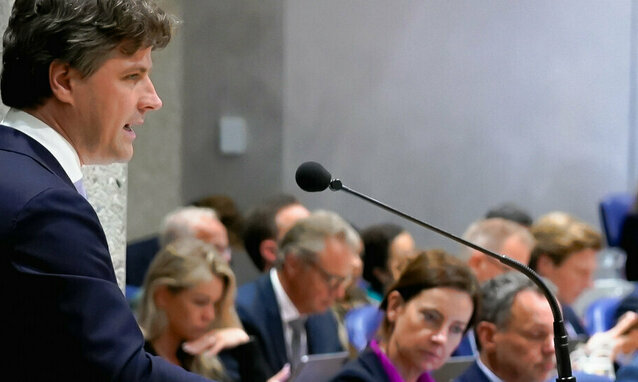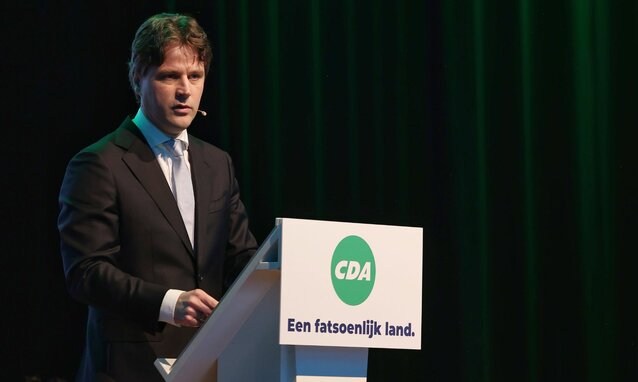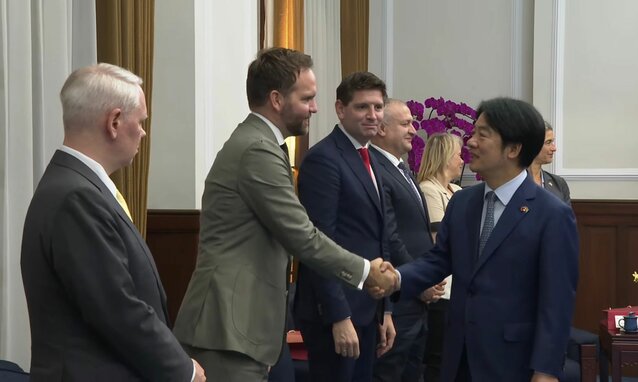
Balkenende | Christian Democratic values and Europe: source of inspiration and requirement to act
Onderstaand de toespraak die voormalig minister-president Jan Peter Balkenende gaf tijdens het EPP Congres in Rotterdam.
Ladies and gentlemen, dear delegations, dear EPP friends,
It is my great pleasure to welcome you at the second day of the EPP congress. We already had a fantastic day yesterday. It is remarkable what EPP and CDA have achieved together in organising this congress. It is great to see you all here again. I would like to open this day by taking you back in history.
Introduction
It is an inspiring fact that the crises of the past two decades have not weakened Europe, but rather brought the individual states closer together. Much has happened in recent years: Brexit, Covid-19, Ukraine. Time and again, the conclusion in Europe has been: 'We need each other'. Europe is a community. The unity of European countries around Brexit, coordination during Covid-19 and economic and ecological strengthening (RRF, Green Deal) are proof of that. And if Russia wanted to break up European countries by the so-called 'military operation', Russia has completely failed: Europe is more united than ever and this has to be continued. However: as a result of this brutal war the Ukrainian people are suffering and our thoughts and prayers are with the people of Ukraine.
Crises have united Europe. However, that is not all. The various crises also exposed challenges. And therefore, in the words of Economics Nobel Prize Winner Jean Tirole (Economics for the Common Good, 2016): 'Europe once again needs a long term vision...We must rehabilitate the European Ideal and remain united around it.' This long term vision will have to be shaped by the awareness that Europe is a community of values. Values that form the core of Christian Democratic politics: solidarity, responsibility, stewardship, justice. Values that find their foundation in universal human dignity. Politics is about doing justice. Perhaps these times call for us to rediscover and live these values anew.
It is remarkable how many moral perspectives are at play in the world of today and tomorrow. The core idea behind the Sustainable Development Goals is: 'Leave no one behind' and Laudato Si' refers to our planet as 'Our Common Home' and underlines the ‘Care for the Creation’. Our times are yearning for this value-driven policy. Societies are ready for it, politics must now show moral leadership. Looking at the developments in context, one notices the importance of Long Term Vision, the European Ideal and to Remain United. From that perspective, I see three central guidelines. A Europe that serves the Sustainable Development Goals of the UN (SDGs).
Europe as a source of inspiration for new connections between economic, social and ecological development. Europe as an advocate of values.
Europe to serve the SDGs
If we want to secure the future of generations to come and our planet and act in a truly sustainable way, we have no choice but to strongly implement the SDGs. In a world of advancing autocrats and democracies in confusion, a global agenda is needed that connects countries, businesses, NGOs, knowledge institutions, and people. The SDGs offer this agenda, summarized as: leave no one behind, improve the quality of life for everyone, and take care of our planet. Europe has much to offer to drive this agenda forward. ‘Show results’, as former European Council President Herman van Rompuy said, ‘and convince people’. Realize reforms and speed up processes of decision making. Acting in this way can also increase Europe's geopolitical weight. Konrad Adenauer once said: 'We all live under the same sky, but we don't all have the same horizon'. The challenges facing the global community require precisely that: a common perspective, a common agenda and moral leadership. Europe has a great responsibility here.
Europe as a source of inspiration for new connections between economic, social and ecological development Worldwide, a debate has emerged on the recalibration of existing economic systems: stakeholder capitalism, moral capitalism, responsible capitalism. In each case, it is about thinking more in the long term, doing justice to all stakeholders and not just the shareholders, and a considerably better balance between economic, social and ecological interests. Values over profits. The climate crisis is forcing us to face the facts, the resource issue could have immense consequences, concerns about increasing inequality are growing rapidly and the consequences could be disastrous. Rhinelandic thinking, the idea of a social and ecological market economy and more trust and cooperation, offers the prospect of a better future for all. But: this only works if real steps are taken. Europe can and must make the difference here. The lessons from 'Why Nations Fail' (Acemoglu and Robinson), which point out the crucial importance of innovation, the rule of law and inclusive institutions, are highly topical.
Europe as an advocate of values
We have become used to developments being dominated by power, geopolitical strength, self-interest, dominance of nation states, autocracy, and political division. The great danger then is that the moral dimension of social issues will be out of sight. In many places, reference is made to the importance of values, purpose, the DNA of organizations, answering the Why question, beyond the bare How or What. Should this not also apply to (geo)political issues? Europe can play a major and stimulating role in all these areas. In quite a few countries, an atmosphere is beginning to emerge in which human rights and democratic and constitutional rules are dismissed as Western values. We know better.
Conclusion
There is a lot at stake in today's world. Achieving the SDGs, responsible socio-environmental and economic development, and global values call for new creativity from Europe. Europe is in fact stronger than we often realise. The EPP has become power-politically defensive in several countries. Recovery of positions will first have to be realized through the line of content. If the EPP puts its own values and principles first, there is a world to be won.
The EPP must have the will to inspire, innovate and implement. Get off the defensive and move forward with passion, based on our own sense of values. Opposite geopolitical power struggles and divisions, leave no one behind in our common home. To rehabilitate the European ideal and reposition the EPP are essential. Much could be accomplished if we would realize the commandment 'Love your neighbour' or 'Love your neighbour as yourself' with the mindset to serve the other. Much to do, much to gain. Let's get to work.
Prof. Dr. Jan Peter Balkenende is Former Prime Minister of the Kingdom of the Netherlands (2002-2010), Honorary Board Member of WMCES and Member of the Club de Madrid



